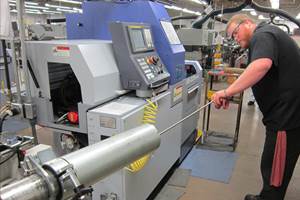What Robots Mean for Your Job
Automation may change your job, but it won’t eliminate industrial employment.
I recently delivered the keynote address at an education conference in which I spoke about the changing face of American industry and the need to rapidly adapt the workforce for an exciting and interesting future brought about by continued advancements in industrial automation and robotics.
While I firmly believe that automation will increase—not decrease—opportunities for industrial employment, my reasons for this belief are not easily articulated and thus I usually end up muffing my way through a response that leaves the listener less than convinced. Perhaps prospectively I’ll direct the poser of the question to this article.
Buggy whip makers found new jobs. In the late 1800s, with the advent of the automobile, people are said to have lamented the doom that would beset the unfortunate people working in plants that assembled horse buggy whips. With the precipitous decline in people purchasing buggy whips, those who made them would soon be unemployed, thus increasing unemployment. More than a century of hindsight exposes the folly of this view as one considers the number of jobs created by the automotive industry as the automobile came of age. Innovation does not necessarily mean a reduction in total employment.
Automation means more hiring. A few years ago Amazon opened up a huge fulfillment center not far from where I live, flush with robots storing, picking and packaging inventory destined for Amazon customers. Amazon, according to one report, doubled to 45,000 the number of robots employed in its operations in 2016 alone.
But by the looks of the want ads, Amazon is aggressively recruiting an army of team members, in jobs from fulfillment representatives to area managers to transportation specialists to loss prevention personnel. Let us not be lulled into the misconception that industrial employment is a zero sum game; that a finite number of jobs exist in industry and for every one job replaced by a robot, an industrial job disappears. As exemplified by Amazon, efficiency and accuracy-driven growth created by the adoption of automation actually create, not eliminate, jobs. And Amazon is only one example. In the U.S., despite rapid adaptation of automation, the unemployment rate currently sits at a 10-year low and industrial employers struggle to fill their ranks with qualified team members.
Your new job will be better. While automation will have a positive effect on employment, it would be naïve to believe that considerable disruption to individual jobs will not happen as a result. A worker with few skills and little ambition to adapt to a rapidly changing industrial landscape has cause for worry if they wish to stay employed in industry. For those who choose to grow, however, a better life awaits. For more than 30 years, a relative of mine worked on an assembly line that manufactured household batteries. 60,000 hours watching batteries go by on an assembly line. Factory automation and robotics replaced her monotonous, mind-numbing job some years ago. There is virtue in any work, and I mean no disrespect to people performing unskilled labor, but generally automation replaces less interesting industrial jobs with opportunities in more fascinating disciplines such as factory automation, robotic programming, troubleshooting and data analysis. What’s more, work which jeopardizes the safety of the worker can also be replaced by automation leading to safer overall working conditions for those employed in industry. Advancing automation means more interesting and safer jobs.
Automation improves standards of living. Industries automate to produce products faster, with fewer defects and less expensively. Who ultimately benefits? The consumer. An iPhone would be prohibitively expensive for all but the wealthy few if the enclosure had to be machined without the benefit of an automated machining center, the IC chips manufactured manually, the circuit board stuffed and soldered by hand and so on. Thanks to automation, a wider number of people benefit from lower cost and more reliable products. Ironically, the same worker whose job we worry may be automated enjoys a much higher standard of living thanks to automation.
Automation may change your job, but it won’t eliminate industrial employment. Rather, the jobs it creates will be more interesting, safer and more rewarding.
Related Content
Manufacturing Skills Training: Virginia Martinez and Laiken Carrillo
Roles of Women in Manufacturing Series: A precision machining career starts with skills. Virginia and Laiken share their journey and how they help prepare the next generation.
Read More6 Tips for Training on a Swiss-Type Lathe
There are nuances to training a person to effectively operate a Swiss-type lathe. A shop I visited a while back offers some suggestions.
Read MoreThe Value of Aligning Efforts to Promote Manufacturing Careers
Successfully building the next generation of manufacturers requires a team effort between employers, educators and parents. Each of these three groups has a tremendous impact on young people’s career decisions. Without the support of all three, we are unlikely to bridge the skilled labor shortage that threatens the future growth of our industry.
Read MoreSuccession Planning: Three 15-Minute Activities to Start Preparing for Tomorrow
Succession planning is planning for the future success of your business.
Read MoreRead Next
Do You Have Single Points of Failure?
Plans need to be in place before a catastrophic event occurs.
Read More5 Aspects of PMTS I Appreciate
The three-day edition of the 2025 Precision Machining Technology Show kicks off at the start of April. I’ll be there, and here are some reasons why.
Read MoreA Tooling Workshop Worth a Visit
Marubeni Citizen-Cincom’s tooling and accessory workshop offers a chance to learn more about ancillary devices that can boost machining efficiency and capability.
Read More








.jpg;maxWidth=300;quality=90)














